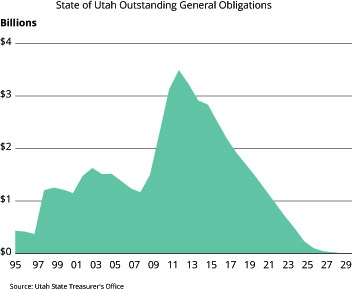
Treasurer Richard Ellis urged lawmakers to slow down in requesting new bond-funded projects. Utah’s debt levels have risen dramatically since 2009, with debt now around $1,000 per capita and 2.5% of total personal income in the state. That ratio of debt to income is quite high compared to other AAA-rated states. He argued that we cannot afford $500 million or more in new debt this coming year, but if we wait a few years new capacity will open up from paying off older bonds.
Senator Wayne Harper showed a list of UDOT’s top-priority highway projects, adding up to more than $2 billion. He proposes a bond of $1.2 billion next year, arguing that this keeps the state below the statutory debt limit. However, he said that the state cannot afford to layer additional bonds for water projects and relocating the state prison on top of this, at least for several years.
Representative Lowry Snow made a strong pitch for a $1 billion bond to build a water pipeline from Lake Powell to serve St. George and surrounding areas. He described the necessity of water supply to allow further economic and population growth in the area, saying “the state that controls its water supply controls its destiny.”
Senator Jerry Stevenson described the need for moving the state prison, estimated to cost $775 billion. The project would not need to start until perhaps 2017, so it could wait for some current debt to be paid off. He also described a possible redevelopment area to capture increased property taxes on the current Draper site as it develops into commercial facilities. This could help repay the state, but with something of a lag.
Phil Dean from GOMB mentioned that water bonds for the future Lake Powell Pipeline or Bear River project would actually be paid back eventually by the users of the water systems. The state provides a sort of revolving fund to back the projects. He also said to watch for the Governor’s budget recommendations in December to see where Governor Herbert stands on these projects.
After the meeting, an influential veteran legislator mentioned that for many years the Legislature kept its statutory debt limit at 45% of the constitutional debt limit (which is based on statewide property values). When legislators authorized the limit to be raised to 85% of the constitutional limit, it was meant to be temporary, to allow the Utah County freeway expansion to be done quickly. Now, the discussion focuses on 85% being the new normal, but his concern is that we could be caught without adequate debt capacity if an earthquake caused widespread damage to infrastructure. In fact, the concern about the 45% limit was also mentioned in yesterday’s Executive Appropriations Committee, as reported in Utah Policy Daily.
And yes, bacon was served at this breakfast.
For more information, see our new report The Role of Bonds in Utah: A Guide to Utah Bonding and its Benefits and Limitations.
Categories:

